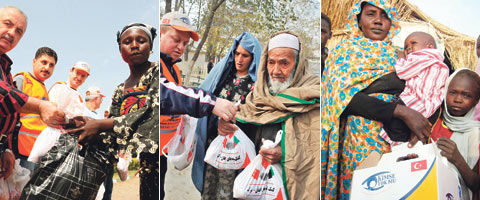Turkish Charities Bring Eid Spirit to Southeast, World
The Eid al-Adha holiday which began last Friday and ended yesterday raised spirits among residents in Turkey's impoverished Southeast and people in need throughout the world, through the work of various Turkish charities.
Following a month-long fundraising drive to collect money for the traditional Muslim sacrifice of an animal on the occasion of the Eid al-Adha (Feast of the Sacrifice) holiday, a portion or all of the meat from which is distributed to the poor, Turkish charities sprung into action to deliver the meat and other forms of aid to those in need throughout Turkey and the world. Several Turkish charity groups, leading them names like the Kimse Yok Mu (Is Anybody There) Association and the Humanitarian Aid Foundation (İHH), distributed food, clothing, money and other forms of assistance to the less fortunate in most of Turkey's 81 provinces and over 120 nations around the world.
The annual efforts for Eid al-Adha are a major part of the calendar for these charity groups, which are active in a variety of fields worldwide throughout the year. The meat alone procured by these groups for the poor - tens of thousands of animals sacrificed according to Islamic standards before being hygienically processed and separated into long-term storage containers - is a boon that will feed hungry people from Turkey to Bosnia and Herzegovina and from Palestine to Latin America who are normally unable to afford the nutritional luxury of meat that many take for granted. Upwards of 3 million people will benefit from the meat distributed as part of this year's Eid al-Adha charity drives by Turkish NGOs, made possible by charitable contributions of TL 250-550 given by members of the Turkish public.

The Eid al-Adha efforts of Turkish charities, however, are about much more than meat. The boxes of meat, foodstuffs, clothing, gifts and other aid do not arrive by postal mail to the tens of dozens of countries -- they are accompanied by the NGO staff and private citizens who choose to spend their holiday working hands-on to deliver the aid in-person. In some regions traveling door-to-door on foot to bring boxes to those who need them, these volunteer workers, among them top businesspeople, also spread holiday cheer and build bonds of fraternity that stand the tests of time and turmoil.
'Spiritual support for democratic initiative'
In regions where help is often offered only with strings attached, the work of these charity groups is breaking down barriers and restoring trust between people. For three years now, businesspeople have been accompanying Kimse Yok Mu volunteers to distribute Eid aid to southeastern and eastern provinces such as Diyarbakir, Siirt, Batman, Van, Şanliurfa, Mardin, Kars, Şirnak and Hakkari, which have suffered nearly a quarter century from terrorism perpetrated by ethnic separatists. Kimse Yok Mu President Mehmet Özkara explained that these in-person visits mean a great deal both to those distributing aid and those receiving it, and that it kindles a lasting feeling of brotherhood between people regardless of ethnicity, what part of the country they live in, or their income level. Three years ago the businesspeople and Kimse Yok Mu volunteers traveling to these provinces stayed in hotels there, but now the people of the region have welcomed them into their homes for the four-day holiday, he said.
One businessman, Kenan Çakirca, explained that in a village in Ağri his group of Kimse Yok Mu volunteers had gone to the home where an impoverished old woman reportedly lived. They knocked and knocked and knocked, but it was a long time before anyone answered the door. "When we told her we'd brought her meat, she started crying. We learned that the PKK had wanted to take her 17-year-old grandson away to the mountains; that's why she wouldn't answer the door. 'Only you and the PKK ever knock at my door,' she told us," said Çakirca.
Faruk Güllü of the famed Güllüoğlu baklava producer, has for three years gone to the Southeast with Kimse Yok Mu. He said his experiences there have taught him that perceptions held by some in western Turkey that easterners have harsh attitudes toward westerners is not true, saying that he was at first shocked by the open warmth he was received with there. He relates the story of last year, when he traveled to a village in Van for the second time in three years and a little boy ran up to him crying, saying that he'd missed him the year before. "It's the first time anyone has ever come to our village and taken care of our needs without demanding anything in return," the boy said. "I'll never forget that boy and his tears," Güllü says.
- Created on .
